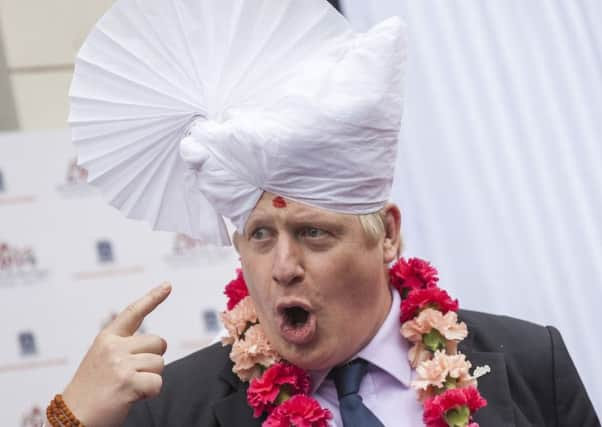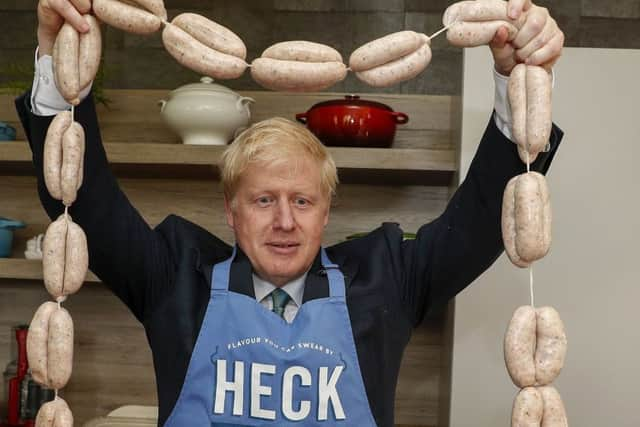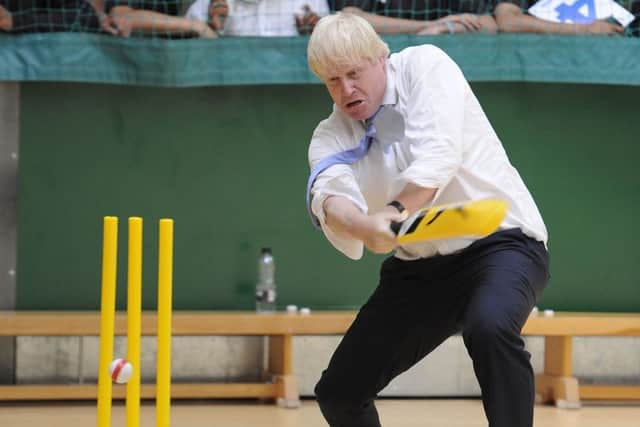Boris Johnson - the story behind the new Prime Minister and Tory leader


That was Boris Johnson’s characteristically eye-catching assessment of his prospects in 2004, the joker-in-chief of politics ready as always with the self-deprecating quip, ruffle of the unruly blond hair and the rueful grin of the naughty schoolboy caught with a catapult in the back pocket of his shorts.
Something he said to his family when he really was a schoolboy is more revealing. He wanted to be “world king”, and he has come as close to achieving that ambition as British public life allows.
Advertisement
Hide AdAdvertisement
Hide AdMr Johnson has wanted the job he gets today for most of his 55 years, unapologetic in his desire and single-minded in his pursuit, along the way becoming one of the most recognisable politicians in the country.


He has long enjoyed a public profile and popularity that was the envy of all in politics, partly because of a willingness to play the fool and appearing not to take himself too seriously, whether dangling from a zip wire that got stuck during the 2012 London Olympics, or gamely being the butt of jokes on Have I Got News for You.
Advertisement
Hide AdAdvertisement
Hide AdBut Mr Johnson is nobody’s fool. Twenty years in the public eye and a knack for bouncing back from setbacks and scandals that might have finished other political careers are testament to that.


Yet despite his charisma and belonging to that exclusive club of public figures so familiar they are routinely referred to by their first names, there is something elusive about Mr Johnson, which is one of the reasons he divides opinion so sharply between admirers and detractors.
To the admirers, he is a supremely gifted politician of formidable intelligence, the most adept communicator of his generation, able to bridge party lines, enthuse often apathetic voters and bring the best out of colleagues, whose personality is characterised by generosity of spirit and social liberalism.
To the detractors, he is a lazy, dishonest chancer with a foul temper driven by a sense of entitlement whose views swing according to what he perceives is best for his own ambition, all cunningly hidden behind the charming façade of “Boris”.
Advertisement
Hide AdAdvertisement
Hide AdHe is not “Boris” to his family. To them, Alexander Boris de Pfeffel Johnson is Al, the eldest of four children who remain very close, born in New York to English parents and formerly holding United States citizenship.
His childhood was partly spent on the family farm in Exmoor, before his father, Stanley, took the family to Brussels when he went to work for the European Commission.
But as his parents’ marriage crumbled, the young Al was sent to boarding school in Sussex, from where he won a scholarship to Eton. At both, the exceptionally bright boy’s intelligence was noted, and when he went to Balliol College in Oxford to study classics in 1983, he stood out not only for the sharpness of his intellect, but because of his larger-than-life character.
The multi-lingual, verbally dexterous student was already cultivating a bumbling, fogeyish persona that might have come from a P G Wodehouse comic novel.
Advertisement
Hide AdAdvertisement
Hide AdElection as president of the Oxford Union soon followed, as did membership of the hard-drinking Bullingdon Club, where his fellow carousers included his close friend Charles Spencer, brother of Princess Diana, and future premier David Cameron, with whom he had a spiky and not always cordial relationship.
Journalism beckoned on graduation, and so did the first of Mr Johnson’s calamities. The Times sacked him for making up a quote. The Daily Telegraph forgave that, appointing him its Brussels correspondent, where he wrote a series of articles attacking the EU.
But scandal soon followed. A recording surfaced of him talking to a friend, Darius Guppy, a convicted fraudster, in which he appeared willing to co-operate in a plot to have a journalist beaten up. Mr Johnson was rebuked by his editor, but kept his job.
Advertisement
Hide AdAdvertisement
Hide AdHe rose to edit The Spectator magazine from 1999 to 2005, but by then his ambitions were firmly directed towards politics. He won the safe Tory seat of Henley in 2001, but yet again there was to be scandal.
The Conservative leader Michael Howard sacked him as shadow arts minister and the party’s vice-chairman in November 2004 after he lied about having an affair with journalist Petronella Wyatt, rubbishing the story as “an inverted pyramid of piffle”.
It wasn’t. Ms Wyatt had become pregnant by her married lover and chose to have an abortion. Mr Johnson initially declined to help pay the £1,500 bill.
This was the first time Mr Johnson’s colourful private life had come to light. During his first year at Oxford, he had met Allegra Mostyn-Owen. They married in 1987, and parted three years later.
Advertisement
Hide AdAdvertisement
Hide AdIn 1993, he married Marina Wheeler, whom he had known since childhood. They have two sons and two daughters, and announced last year that they were beginning divorce proceedings.
In 2013, a daughter Mr Johnson had fathered out of wedlock was revealed in a court case over an injunction seeking to ban reporting of her existence. The court was told he was also the father of another child.
His current girlfriend, Carrie Symonds, became the subject of intense media attention during Mr Johnson’s leadership campaign, when neighbours called the police after becoming alarmed at hearing a furious row between the couple at her flat.
Personal ups and downs didn’t derail his career. In 2008, he became the most popular elected Conservative in the country as Mayor of London, holding the post for eight years, but once again he was a divisive figure.
Advertisement
Hide AdAdvertisement
Hide AdDuring his two terms, he won praise for improving the Tube, introducing the congestion charge and cheerleading for Britain during the joyously successful Olympics.
But he was criticised for wasting £43m on an abortive project to build a “garden bridge” across the Thames, and his slow reaction to rioting in 2011, when he initially refused to return from holiday in Canada. Mr Johnson then bought water cannon to deal with rioters, which were banned from use in the UK.
He returned to Parliament in 2015 as MP for Uxbridge and South Ruislip, and the following year became the public face of the campaign to leave the EU, posing with the campaign bus carrying a slogan that implied quitting would release £350m more for the NHS.
Mr Johnson had long appeared ambivalent in his attitude to the EU, which gave ammunition to critics who accused him of being untrustworthy and lacking real principles.
Advertisement
Hide AdAdvertisement
Hide AdHe once wrote that membership “has brought palpable benefits to Britain in free trade and bestowing British citizens the rights of free movement and free establishment in the EU, and withdrawal would mean a potentially worrying loss of influence.”
And before advocating leaving in a newspaper article, Mr Johnson admitted he had written an alternative piece arguing for continued membership.
His star looked set to rise to its highest after David Cameron’s resignation. Mr Johnson was the front-runner to succeed him until, in one of the most wounding political condemnations of modern times, Michael Gove accused him of being unfit to govern, saying: “Boris cannot provide the leadership or build the team for the task ahead.”
Nevertheless, Theresa May appointed him Foreign Secretary. But his two years before he resigned over her Brexit policy were widely derided, with accusations of laziness and a failure to master detail.
Advertisement
Hide AdAdvertisement
Hide AdBoris Johnson’s turbulent life has been a succession of rises and falls. Today he makes the most spectacular rise possible in British politics. Time will tell if it is destined to be followed by the most spectacular of falls.
Boris Johnson: A timeline
1964: Boris Johnson was born in New York and spent his earliest days there.
1977: Starts at Eton having won a scholarship.
1983: Goes to Balliol College, Oxford, where he studied classics.
1987: Married Allegra Mostyn-Owen. They parted three years later.
Advertisement
Hide AdAdvertisement
Hide Ad1993: He marries again, this time to Marina Wheeler. They have two sons and two daughters.
2001: He becomes an MP, replacing Michael Heseltine in the safe Conservative seat of Henley-on-Thames.
2008: Johnson is elected Mayor of London after defeating Ken Livingstone.
2015: Returns to Parliament as MP for Uxbridge and South Ruislip.
2016: Appointed Foreign Secretary. He resigned last year over Brexit.
2019: Elected new Tory leader.